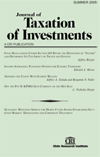The OECD’s Action to Prevent Base Erosion and Profit Shifting
Author: James G.S. Yang.; Victor N.A. Metallo.
Source: Volume 35, Number 03, Spring 2018 , pp.63-83(21)

< previous article |next article > |return to table of contents
Abstract:
The abuse of tax loopholes in international taxation has led the G20/OECD to issue a 15-point Action Plan. This article elaborates on some details of these actions, the most important of which, Action15, recommends development of a “multilateral instrument,” with the hope that all countries could agree to a unified master tax treaty. The differences in tax law among countries--ranging from tax rates, worldwide versus territorial tax systems, to the tax treatment of domestic and foreign corporations--lead to tax loopholes. The authors use three examples—Burger King, Amazon, and McDonald’s— to explain the phenomenon, investigating the tax strategies these companies designed to take advantage of the loopholes. The authors also provide four case studies—Apple, Starbucks, Fiat, and Google. Furthermore, the article reveals a developing, new principle in international taxation: the source of income of a high-tech product is no longer the country of production or sales, but the country where the technology is invented.Keywords: international taxation, source of income, tax loopholes, profit shifting, worldwide tax system, territorial tax system, controlled foreign corporation, transfer pricing, OECD, multilateral instrument
Affiliations:
1: Montclair State University; 2: Montclair State University.